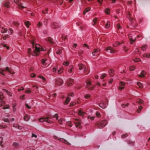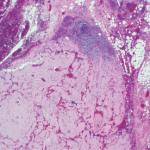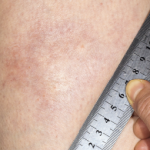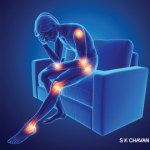Dan Reynolds, the lead singer of the Grammy award-winning band Imagine Dragons, has partnered with Novartis to increase awareness of ankylosing spondylitis.


Dan Reynolds, the lead singer of the Grammy award-winning band Imagine Dragons, has partnered with Novartis to increase awareness of ankylosing spondylitis.

RheumPAC is the ACR’s non-partisan political action committee, which promotes the needs of rheumatology providers and patients. Advocacy efforts often focus on legislation to improve the day-to-day clinical care of rheumatology patients, such as establishing clinical exceptions to step therapy requirements and reforming the prior authorization process. In addition, the ACR and RheumPAC recognize the…

Elizabeth Hofheinz, MPH, MEd |
Researchers who devote their time to studying lupus are accustomed to considering environmental stimuli such as sunshine and cigarettes. But according to Gregg J. Silverman, MD, a professor in the Department of Medicine and in the Department of Pathology at the New York University (NYU) School of Medicine and co-director of the Musculoskeletal Center of…

Naveen Raj, DO, & Lisa Duncan, MD |
Hepatitis B virus (HBV) associated polyarteritis nodosa (PAN) is an increasingly rare vasculitis in developed countries due to advances in HBV vaccination and antiviral therapy. However, the condition does persist, and rheumatologists should consider it when evaluating vasculitis cases. Below, we discuss a case that illustrates the varied clinical presentations PAN can encompass. A high…

Catherine Kolonko |
The body uses B cells to produce antibodies that can fight off infection by invading antigens and bacteria. But in rheumatoid arthritis (RA), the immune system produces autoantibodies that work against the body’s proteins to attack joint tissues. Researchers believe this process is helped along by autoreactive B cells that live in bone matter and…

Tej Bhavsar, MD, & Nancy Joste, MD |
A 54-year-old African American man arrived at the emergency department with the acute onset of a tender mass on the left side of his neck. It had been getting progressively larger for the preceding two days. History & Examination His history included chronic right hip osteoarthritis with two surgeries performed five years prior. At his…
During the 2019 ACR/ARP Annual Meeting, the new Meet the Professor Workshops and sessions will feature hands-on training on state-of-the-art topics…
Megan Brooks |
NEW YORK (Reuters Health)—Anti-fracture medications do not reduce overall mortality in older patients with osteoporosis, according to an updated systematic review and meta-analysis. “This meta-analysis suggests drug treatments, including treatment with bisphosphonates, for osteoporosis should be recommended only for the prevention of fracture and not for any additional reduction in mortality,” researchers write in JAMA…

In September 2018, the U.S. Food & Drug Administration (FDA) granted fast-track status to FCX‑013, a gene therapy product developed to treat moderate to severe localized scleroderma (morphea). Previously, the treatment received an orphan drug designation for localized scleroderma, as well as a rare pediatric disease designation. Phase 1 and 2 studies will assess safety…

Taylor Faulk, MD, & Matthew B. Carroll, MD |
Autoinflammatory diseases are genetically diverse, but clinically similar, conditions distinct from autoimmune illnesses, such as systemic lupus erythematosus or rheumatoid arthritis. Clinically, they are defined by recurrent episodes of inflammation that follow a characteristic pattern each time they occur. Some have a set length of time during which fever, peritonitis or arthritis manifest. Others are…